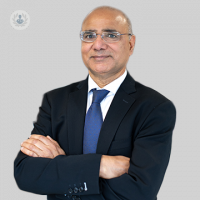All we need to know about hormone replacement therapy
Written in association with:On hand to provide us with all the important nuggets of information with regards to hormone replacement therapy is esteemed consultant obstetrician and gynaecologist, Mr Mohammad Masood.

What is HRT, and what is it used for?
Hormone replacement therapy (HRT) is a medical treatment primarily used to alleviate symptoms associated with menopause in women. Menopause, which typically occurs between ages 45 and 55, marks the end of a woman's reproductive years and is characterised by a significant reduction in the hormones oestrogen and progesterone. This hormonal decline can lead to various uncomfortable symptoms, including hot flashes, night sweats, mood swings, and vaginal dryness. HRT aims to replenish these hormone levels, providing relief from these symptoms.
What are the main types of HRT?
There are two main types of HRT: oestrogen-only therapy and combined oestrogen-progesterone therapy. Oestrogen-only therapy is usually prescribed for women who have had a hysterectomy, as estrogen alone can increase the risk of endometrial cancer. Combined therapy, which includes both estrogen and progesterone, is recommended for women with an intact uterus to counterbalance the cancer risk. HRT can be administered in various forms, including pills, patches, gels, creams, and implants, allowing for flexibility based on individual preferences and medical considerations.
What are the associated risks?
While HRT can be highly effective in managing menopausal symptoms, it is not without risks. Studies have shown that long-term use of HRT can increase the risk of breast cancer, heart disease, stroke, and blood clots. As a result, it is generally recommended that HRT be used at the lowest effective dose for the shortest possible duration. Regular monitoring and consultations with a healthcare provider are essential to ensure that the benefits of HRT outweigh the potential risks.
What are the benefits of HRT?
In addition to alleviating menopausal symptoms, HRT has been found to offer other health benefits, such as reducing the risk of osteoporosis and fractures by maintaining bone density. It may also positively affect mood and overall quality of life for many women during their postmenopausal years.


